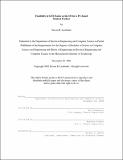Feasibility of GNU/Linux as the OS for a PC-based medical product
Author(s)
Lustbader, Steven B. (Steven Benjamin), 1980-
DownloadFull printable version (136.5Kb)
Alternative title
Feasibility of GNU/ Linux as the operating system for a personal computer -based medical product
Other Contributors
Massachusetts Institute of Technology. Dept. of Electrical Engineering and Computer Science.
Advisor
Bob Desmarias and Barbara Liskov.
Terms of use
Metadata
Show full item recordAbstract
Linux has become a viable alternative to Windows in recent years. This investigation looks at the feasibility of porting the software for a PC-based medical device to Linux. Using an open-source operating system frees developers from the constraints imposed by relying on a single company for the development platform. Several porting methods are considered. The port method chosen allows development on the Windows version to continue while simultaneously testing on Linux, without creating separate versions of the software. Differences in the way the software interacts with the operating system and with the hardware have to be addressed. A Linux environment was created in which to run the software and determine how to reconcile these differences. No major hurdles to using Linux exist, so it appears to be a viable platform on which to conduct future development.
Description
Thesis (M.Eng. and S.B.)--Massachusetts Institute of Technology, Dept. of Electrical Engineering and Computer Science, June 2003. Includes bibliographical references (leaves 20-21). This electronic version was submitted by the student author. The certified thesis is available in the Institute Archives and Special Collections.
Date issued
2003Department
Massachusetts Institute of Technology. Department of Electrical Engineering and Computer SciencePublisher
Massachusetts Institute of Technology
Keywords
Electrical Engineering and Computer Science.